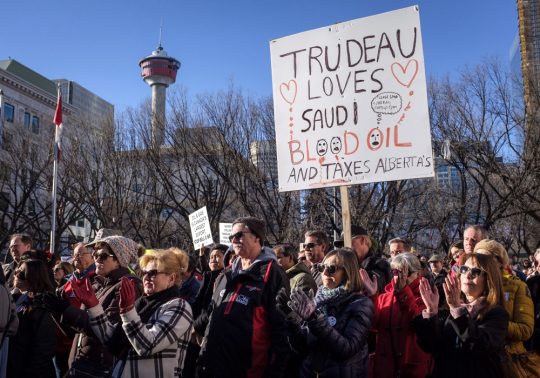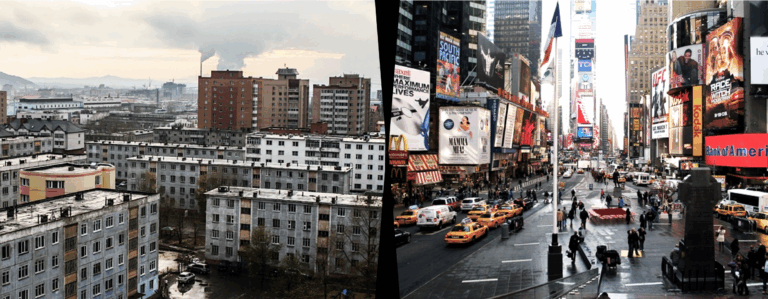Albertans are living in year five of a nightmare that just keeps getting worse. That nightmare started in 2015 when our newly elected Prime Minster appointed Gerald Butts, head of the Canadian arm of the anti-fossil-fuel World Wildlife Fund, as his Principal Secretary and key advisor. A year later, Justin Trudeau cancelled the previously approved Northern Gateway Pipeline that was to run from central Alberta to the B.C. port of Prince Rupert. Then in early 2017, Trudeau made his infamous visit to Alberta where he advocated the “phase out of the oilsands”. Later that same year came the demise of the Energy East Pipeline that needed to transit Quebec on its route from the Prairies to the New Brunswick port of Saint John when, after the regulatory hearing and consultation process had been completed, Trudeau acceded to Quebec’s objections by inserting new, deliberately impossible conditions.

With no access to tidewater and global markets, Canadian crude oil exporters were left hostage to American oil refiners, driving down the pricing received by our producers in a phenomenon known as a “captive market discount”. At times, this foregone revenue totalled as high as $2 billion per month. Had the cancelled pipelines been built, those lost tens of billions of dollars, net of government royalties and taxes, would have put the industry in a vastly stronger position. Instead, most companies were already on the edge of a financial precipice when the Covid-19 crisis slashed world oil demand by an unprecedented amount. Their only hope was government aid. But this prospect was vehemently opposed by the anti-fossil-fuel groups, most of whom make their living off the public purse.
On March 25, a collection of 108 groups comprising public service unions, environmentalists including the Sierra Club and Greenpeace along with civil disobedience advocates Extinction Rebellion, Climate Justice and Climate Strike, sent a letter to the Prime Minister, stating: “Giving billions of dollars to failing oil and gas companies…only prolongs reliance on fossil fuels”. Then came another letter from 265 Canadian university professors arguing the industry should be left to die, with the public assistance funds instead going to green energy development. (Speaking of green energy, Planet of the Humans, a powerful new documentary produced by erstwhile environmentalists’ hero Michael Moore, is a myth-buster that’s shaking the green energy establishment to its roots.)
When help came, it was both modest and selective: one-year loans at “full commercial interest rates” for qualifying companies. It’s hard to think of a more modest measure for an industry employing half-a-million people facing existential crisis. By comparison, in the 2009 Ontario auto industry crisis, the federal government injected $20 billion, without repayment requirements, to save just 22,000 jobs.
Those letter-writers may have gotten their way. On April 17, Trudeau announced “assistance” to the energy sector that focused on the final cleanup and abandonment of no-longer-producing (or “orphaned”) oil and natural gas wells. An important program, to be sure, but hardly central to saving the oil and natural gas industry from the twin-devastation of collapsing world oil markets and a deep economic recession. It was largely optics, in other words; our “woke” prime minister was trying to have it both ways. And indeed, three days before, Alberta oil prices had gone below zero, pushing many companies off the precipice.
But when help came, it was both modest and selective. The Business Development Bank of Canada announced $15 million to $60 million in one-year loans at “full commercial interest rates” for qualifying small and medium-sized companies. While providing a temporary reprieve for some, it’s hard to think of a more modest measure for an industry employing half-a-million people facing existential crisis. By comparison, in the 2009 Ontario auto industry crisis, the federal government injected $20 billion (in 2020 dollars), without repayment requirements, to save just 22,000 jobs.


This is not just an Alberta and Saskatchewan problem. The oil and natural gas industry has long been the very engine of Canada’s economy. From 2014-2018, it contributed over $100 billion to our annual GDP, including tens of billions of dollars in direct payments to governments, plus income taxes paid by the industry’s employees. The industry’s average capital spending of $40 billion per year included sourcing manufactured equipment across the country, spreading jobs and wealth from coast to coast. Moreover, Alberta has long been the largest net contributor to federal revenues. A recent Fraser Institute study found that from 2014 to 2018 Alberta’s net contribution to Ottawa was $94 billion, $36 billion more than Ontario, a province with a population three times as large.
The Covid-19-driven collapse in crude oil demand handed Soviet strongman Vladimir Putin and Saudi Crown Prince Mohammed Bin Salman a perfect opportunity to achieve their longstanding goal of crippling the U.S. and Canadian industries by driving down prices.
Even in 2019, despite relatively weak commodity prices further lowered by captive-market discounts, oil and natural gas and its derivatives made up five of Canada’s top-ten net (exports minus imports) exports, at US$115 billion. And here is a dramatic illustration of Canada’s dependency on our bountiful resource endowment. Of Canada’s top-ten net exports, seven were natural resources and the other three agricultural. Vehicles aren’t among the top-ten net exports because we import more than we export.

Korea’s economy has already bounced back from Covid-19 because it’s a manufacturing powerhouse. Countries need to play to their strengths. The last thing they should do in a crisis – or ever, for that matter – is trash the industry or industries that form the basis of their prosperity. For Canada, the answer couldn’t be clearer. Our recovery will depend on government policies that actively encourage, rather than impede, resource investment.
Over the past few years, production growth from U.S. oil shales and Canadian oil sands has substantially reduced the Saudi Arabian and Russian shares of global oil markets. To say this has caused consternation in those two oil-dependent countries would be a severe understatement. Russia, especially, is almost obsessed with undermining the Americans’ energy advantage. The Covid-19-driven collapse in crude oil demand handed Soviet strongman Vladimir Putin and Saudi Crown Prince Mohammed Bin Salman a perfect opportunity to achieve their longstanding goal of crippling the U.S. and Canadian industries by driving down prices.

If the current situation persists, it would be a significant blow to the U.S., but America’s world-leading industrial diversification would carry it through. Low energy prices are helpful to that country’s immense manufacturing, transportation and consumer sectors, offsetting the damage to industries that benefit from higher energy prices.
By contrast, resource-dependent Canada would lose its most economically important industry. (The fact that our currency fluctuates along with crude oil and natural gas prices rather than, say, indexes of manufacturing industry health, illustrates how the world sees us – even if our Prime Minister, the Liberals and Canada’s other left-wing parties don’t.) And the country’s most important resource-producing province would move from Canada’s biggest net economic contributor to the most impoverished. Newfoundland, already in desperate financial straits, would be devastated, Saskatchewan would be severely damaged, and B.C. would feel the effects as well.

The Covid-19 experience also teaches us the folly of depending on other countries for critical supplies. Energy is the most important of those. The Energy East pipeline cancellation has left Quebec and the Atlantic provinces dependent on oil now supplied mainly by guess who…Saudi Arabia. With a dose of political will and a modicum of vision the project could be fast-tracked, however, as it mostly involves converting an existing natural gas pipeline to crude oil service.
Nor are North American policymakers completely helpless on the pricing front. As long as North America produced far less crude oil than it consumed, we had no direct or short-term ability to influence global energy prices. That has all changed thanks to the dramatic increase in U.S. and Canadian oil production over the past decade. Canada should immediately engage the U.S. administration to set a viable minimum North American benchmark oil price and phase-in a ban on offshore imports. There is no time to lose. Every day that goes by sees the industry most important to restoring the health of our government finances weaken further. And any hope that Albertans have of waking from their tragic, more than five-year-long nightmare further diminishes.
Gwyn Morgan is the retired founding CEO of Encana Corp.





